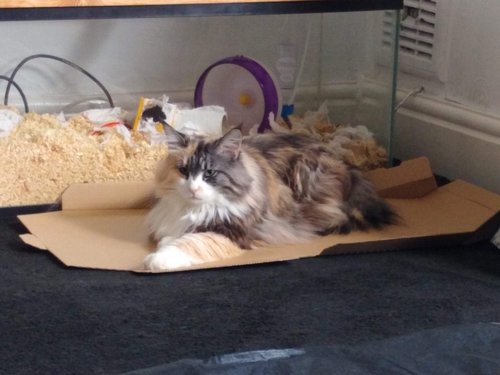Before Getting a Pet
This is an article to help with items to consider before getting a pet. Even if you have had a pet before, it is worth going through this checklist.
If you are thinking about getting a pet, please research first. Even if you have had the type of animal before, guidelines and opinions change particularly health wise.

I used to have ferrets and during the time that I had them, the veterinary guidelines changed regarding spaying/neutering. It is now not recommended to get them neutered at 6 months. Other options are available such as implants. It is still a contentious issue - I mistakenly asked at a ferret fundraiser and got a groan and an eye roll.
With my pets, I try to keep an ear out for any changes recommended for pet care it isn't always easy. Nowadays, I make my children do the research and get them to tell me what they find. (I do check as well.) My daughter watches YouTube videos and found a great channel about caring for hamsters. She tells me what she has seen and what she would like to do for ours. I think this is amazing as it teaches responsibility and enables children to take responsibility for their pets' welfare.
So if you are thinking of getting a pet, this may be of help to you. Hopefully, some points to think about and consider. Needs and animal welfare will be different for each animal.
Getting a Pet
Before you get a pet make sure you have researched the requirments of the animals first. Make sure that you will be able to look after all its needs for its lifetime. This may be twice daily walks for a dog, to feeding a rodent.
It is important that you are sure you have the time to look after the animal and its needs for the whole of its life time. Even small rodents such as degus can live in captivity for up to 13 years. There is a lot to think about!
Research first! Just because the shop is selling it, doesn’t mean it is good or safe for the pets. This goes for everything including cages, food, bedding, treats and toys.
Species
Learn about the type of animal first. Sometime different breeds can have different personalities. Some breeds may suit you and your family better than others. Do you want a rodent that is up in the day or are you ok with a pet that is mostly nocturnal.
Male or Female?
Sometimes, males and females have different personalities, habits or health requirements. For example, male rats leave a trace of wee everywhere.
Friends or Solitary
Even different breeds of the same species can have completely different behaviour and needs. One type of dwarf hamster called Roboski prefer to live in pairs or small groups whereas all other hamsters will fight if they live with another. Some mice are happy in pairs or small groups, whereas multimammate mice prefer to be in small groups.
Lifestyle/Behaviour

Will you have time for your new pet? For the animals entire life? Does it fit in with you? Can you look after all its needs? Think about what you want in a pet. Don’t chose a nocturnal animal if you want to see it active in the day time.
Dogs can't be left for long periods of time but cats usually don't mind if they are left alone all day. Some dogs need a lot of exercise whereas others need short bursts.
Handling
New pets will need time to adjust. Some pets will like being with people and handled straight away. Others may take a while to get used to being handled. Caution with some small furries as they can be very fast and may nip. Cats and dogs can take a few weeks to settle in. Patience may be needed accompanied by training.
Cage
If your new pet is to be kept in a cage, research what sort of cage is best. Wire or tank; different levels, spacious. I always recommend that you get the biggest cage you can. Make sure the cage is suitable for if you have other pets. For example, cats, make sure the cage is cat proof or can be kept somewhere where the cat can’t get to.
Cage Contents / Toys
If you have a small furry, make sure that the substrate is safe for the pet. Sawdust is not suitable for all pets i.e. rats. Some of the bedding sold isn’t suitable for hamsters as it will get caught in their cheeks.
Make sure you have a cage so that you can put enough items and substrate in. Some animals like it the floor covering deep so they can burrow.
Ensure you have toys and cage furniture that encourages natural behaviour and is safe. With toys, check them regularly to make sure that they are still safe for the pet.
Food
Research what food is needed for the pet. There are lots on the market for all animals including diets for specific medical needs. Some food is better than others, some is easier to obtain. You may have a preference as well such as fitting in with your own lifestyle. The ideal food will depend on lots of variables such as the pet, the pets daily activity and the age of the pet. Some pets have food allergies too.
Treats
We all love a treat and animals are the same. Some are healthier than others. As with humans, treats should be used infrequently (or as rewards for training). Pets can put on weight and suffer from weight related illnesses.
Exercise / Activities
Different animals need different types and amounts of exercise. Really check out what an animal will need. I know that I will never be able to get up early to walk a dog.
It is great for the animals mental health to have different types of exercise and mental stimulation as well. Make sure you have plenty of activities to keep the pet busy and happy.
Activity feeders are a great way for pets to be fed, have treats and to be kept entertained.
Routine Pet Maintenance
Have you got enough time to look after the pets needs? Depending on the pet, the daily needs could range from feeding to a couple of hours walk. Then weekly, there are often bigger cleaning tasks.
Danger
It is important to consider possible dangers. Again, this relates strongly to the type of animal you are thinking of having.
If you are getting a rodent and already have a cat, research what cage will mean the rodent will be safe.
Plants, candles, household items, certain foods can be poisonous to pets.
Vets
Before you get a pet, research the vet you may take the animal to if they get sick. Not all vets will treat all animals and some are specialist in certain areas. Ask for recommendations from people with similar animals.
Some vets offer new puppy/kitten/rabbit vaccination packages. It is helpful to register with a vet before you need one for an emergency.
It may be useful to research what sort of illnesses may occur in the animal or breed you are interested in. That way you can keep any eye out for early signs and get treatment at the early stages.
Final Note
Reading books and researching on the internet as well as chatting with other pet owners is a great way to find out more.This is just a short list and it will vary depending on the individual pet. Keeping pets happy - mentally and physically is very important.
It was difficult to write a generalised article as there are so many variables. If you are thinking about getting a particular pet, and would like a few tips, please get in touch with me.
On a personal note, if you are thinking about getting a pet, please consider a rescue pet. There are so many animals needing homes. If you want a specific breed, there are breed specific rescues. I got my previous cat Ginger, and my current cat Fermi from the Norwegian Forest Cat Rescue. Both were about 6 years when we got them.

